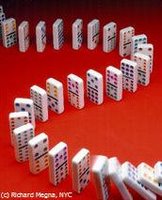
I understand that newspapers are losing readership to electronic
media, but I also hear that newspaper publishers everywhere are
being bid for at rising prices. What is going on?
Freedom of the presshas been the approved moral position of our culture for centuries.
During those same years, however, monopolization of the
press &mdash which began with moveable type and now charges
ahead in this mystifying time of digital "yes" and "no" &mdash
has had its loyal supporters.
In the sea of media in which we are engulfed, there is an
endless supply of such contradictory stances.
We have mounting evidence of the dreadful cost to society of
obesity, together with increasingly skillful manipulation of
our eating habits by advertising agencies (in the direction of
more calories). We witness encroaching centralized control of
media, and simultaneously unfettered freedom for individuals,
as exemplified by this very blog (among
millions).
We are lectured to by those who would guide us to financial
freedom through prudent savings, and we are overwhelmed by
vendors promising us:
"Buy now, and don't pay anything for 12 months!"
Free enterprise and freedom of the press must mean that we
are free to read, to look, to listen, to do whatever we like.
No doubt there are some who turn everything off as they go about
their mental lives, but they are indeed few. Most of us abhor
silence, and welcome input. When forced to wait, we pick up
something to read or listen to or even to watch. Of course,
it must be our own fault if, in so doing, we invite pressures
on ourselves &mdash or is it?
Philosophize as we will, in the meantime the free presses are
rolling, and rolling all over us. All this begs the question:
Are we as "free" as they are? That should make us think. At least
we are still free to do that &mdash the last time I checked.





